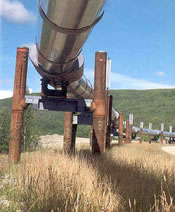While control over routes for the export of oil and gas to Western markets was clearly not the primary cause of the recent hostilities between Moscow and Tbilisi, the vital role of the Caucasus as an energy transit route nevertheless cannot be ignored in the context of Russia's increasingly tense relationship with the United States and its European allies. The collapse of the Soviet Union in the 1990s led to the formation of several breakaway republics in the Caspian region, an energy-rich area which had been off limits to Western investment. That these newly formed states with substantial reserves of hydrocarbons -- Azerbaijan and Kazakhstan in particular -- should open their doors to international energy companies was a high priority of the Clinton administration. The United States also saw that drawing these new states into the Western orbit would have two major strategic benefits: the diversification of energy supplies away from the Middle East and the limiting of Russian influence in an emerging energy-rich region -- a convenient post-Cold War dividend indeed.
U.S. Energy Interests and the Caspian: The Free Ride is Over

